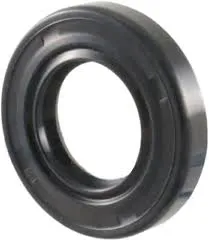10 月 . 11, 2024 14:46 Back to list
rotary oil seals
The Importance of Rotary Oil Seals in Mechanical Systems
Rotary oil seals, also known as rotary shaft seals or oil lip seals, are critical components used in a variety of mechanical systems to prevent leakage of lubricants and contaminants. These seals play a crucial role in maintaining the integrity and efficiency of machinery, ensuring that they operate smoothly and reliably. In this article, we will explore the design, functionality, and applications of rotary oil seals, highlighting their importance in various industries.
Design and Structure of Rotary Oil Seals
Rotary oil seals are designed to fit around a rotating shaft and create a barrier that prevents oil, grease, or other fluids from leaking out of the system while also keeping dirt and debris from entering. The primary components of a rotary oil seal include the seal body, a sealing lip, and a spring. The seal body is usually made from rubber, elastomer, or plastic, providing flexibility and resistance to wear.
The sealing lip is a critical feature of the oil seal, often designed with a specific angle and depth to create effective contact with the shaft surface. This contact helps to form a dynamic seal that can endure the rotational movement of the shaft while minimizing friction. The spring, typically positioned around the inner part of the seal lip, exerts a radial force that maintains the contact pressure between the sealing lip and the shaft, ensuring an effective seal throughout the operating conditions.
Functionality of Rotary Oil Seals
The primary function of rotary oil seals is to prevent fluid leakage in rotary applications. In engines, for example, these seals are employed to retain oil in the crankcase and prevent it from leaking into the combustion chamber. This not only conserves lubricant but also protects the engine components from potential damage caused by lubricant loss or contamination.
Furthermore, rotary oil seals are engineered to handle variations in temperature, pressure, and speed
. They can be designed to withstand high temperatures and resist chemical aggression from lubricants or environmental conditions. This adaptability makes them suitable for applications across different industries, including automotive, aerospace, marine, and manufacturing.Applications of Rotary Oil Seals
rotary oil seals

1. Automotive Industry Rotary oil seals are widely used in various automotive components, including engine seals, transmission seals, and differential seals. They help maintain fluid levels, enhance efficiency, and prolong the lifespan of vehicles.
2. Aerospace In the aerospace sector, rotary oil seals are critical for maintaining the integrity of systems such as engine bearings, lubrication systems, and hydraulic systems. Their high-performance materials are designed to withstand extreme temperatures and pressures associated with flight.
3. Industrial Machinery In manufacturing environments, rotary oil seals are found in pumps, compressors, and electric motors. They are essential for preventing oil leaks that can lead to equipment failure and costly downtime.
4. Marine Applications Rotary oil seals are used in marine engines and gearboxes to prevent seawater intrusion and protect internal components from damage. The seals must resist corrosion due to exposure to saltwater and other harsh marine conditions.
Maintenance and Selection of Rotary Oil Seals
To ensure optimal performance, regular maintenance and proper selection of rotary oil seals are imperative. When choosing a rotary oil seal, factors such as the shaft diameter, operating temperature, and pressure conditions must be considered. Manufacturers often provide specifications that guide users in selecting the right seal for their application.
Additionally, regular inspections can help identify signs of wear or damage to the seals, allowing for timely replacements that prevent significant issues like leaks or component failure. Using the correct installation techniques and lubricants during the setup can also enhance the sealing performance and lifespan.
Conclusion
In conclusion, rotary oil seals are vital components that serve to preserve the functionality and reliability of various mechanical systems. Their ability to prevent fluid leakage while resisting contaminants is essential across multiple industries, contributing to the efficiency and longevity of machinery. Understanding their design, functionality, and applications can help engineers and technicians make informed decisions in maintenance and selection, ultimately leading to improved system performance and reduced operational costs. As technology advances, the evolution of rotary oil seals will continue to play a pivotal role in enhancing the reliability and efficiency of modern mechanical systems.